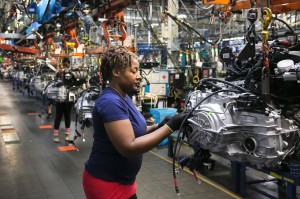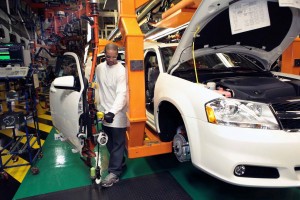The U.S. auto industry was the little engine that could during the country’s recovery from the Great Recession, but it now may be turning into the anchor on an economy once again starting to sputter.
U.S. factory output slipped by 0.4% last month, a sharp turnaround from the 1.1% increase in April, the Federal Reserve reported on Thursday morning. While some industries continue to show strength, the weak figures for May coincide with growing production cuts by the U.S. auto industry.
And the auto industry is facing still more jobs cuts in the months to come, industry analysts warn, especially if car sales don’t level out. GM, for one, has announced that it will extend its normal, two-week summer shutdown to as much as five weeks at some plants in the Midwest.
There are some positive signs in the figures the Fed released on Thursday. Utility production rose 0.4% in May, and mining activity surged 1.6%, its second consecutive monthly gain. Overall industrial production was flat, with those sectors factored in. And there have been some gains in home building and in the sale of industrial machinery.
But the automotive industry is becoming one of the more troubling signs that the economy could be slowing down, industry analysts have been warning.
Automakers were among those hardest hit when the U.S. economy last fell into recession. Two of Detroit’s manufacturers, General Motors and Chrysler Corp., declared bankruptcy and survived only with the help of massive bailouts. Chrysler ultimately had to merge with Italy’s Fiat to form Fiat Chrysler Automobiles.
But as the economy struggled to emerge from the Great Recession, rapid gains in car sales provided a strong foundation for recovery. After stumbling below the 10 million mark – the industry’s biggest decline in decades – sales surged to a record 17.55 million in 2016, setting the third consecutive annual record.
How deep things will tumble is far from certain. Consultancy IHS Automotive has forecast sales will dip by about 100,000, to around 17.4 million, for all of 2017. But a number of analysts have begun recalibrating their forecasts to reflect the continuing slowdown in the automotive sector. A survey of analysts by Bloomberg News found the consensus forecast now down to 17.2 million for the full year. Joseph Spak, of RB Capital, is one of the most bearish, predicting a drop to just 17.1 million.
A report by outplacement firm Challenger, Gray & Christmas shows that the auto industry had expected to cut 20,271 jobs last month. The vast majority of those came at Ford. The second-largest automaker suffered a 5.1% dip in sales during the first four months of 2017, though it reported an unexpected 2.2% increase for May.
Overall, automotive sales tumbled into the red again last month, and automakers are struggling to decide whether to try to buoy demand with new sales incentives or hunker down and reduce production to level off rising inventories.
General Motors is one maker opting for the latter strategy, CEO Mary Barra asserting the need to bring production in line with demand – a strong counterpoint to the approach GM used in the run-up to the last recession.
The company will extend from two to five weeks the normal summer shutdowns at plants in Lordstown, Ohio, and Fairfax, Kansas. And other cuts in production could follow, analysts have cautioned. The maker has also taken steps to eliminate shifts at five of its plants in recent months.
(For more on that move by GM, Click Here.)
Fiat Chrysler Automobiles, meanwhile, has two plants on complete shutdown for at least the rest of the year, both being converted from slow-selling passenger car production to build light trucks FCA hopes will be in higher demand.
The news from the auto industry hasn’t been entirely bad. Ford was responsible for the majority of production and job cuts in May, but the maker did announce that it will increase activity at some plants in the coming weeks as it tries to take advantage of the ongoing light truck boom. SUVs, crossovers and pickups now account for almost two-thirds of overall U.S. sales, and Ford has lost momentum in that sector.
(Ford raising production levels of small utes. Click Here for the story.)
But despite such increases, Ford could also see further cuts, especially on the passenger car side, with products like the Fusion and Focus sedans, observers are warning.
Jeff Schuster, senior vice president at LMC Automotive, said he has been “a bit surprised” by the discipline the industry has imposed on itself, cutting production rather than trying to force vehicles onto a declining market.
Spak, of RB Capital, agreed, but cautioned that this will likely mean that “demand settles at a lower level.”
While that could prevent the sort of deep losses that nearly broke the auto industry barely a decade ago, it could be a problem for the U.S. economy overall.
As a major force in the industrial sector, as well as one of the larger export bases, any cutbacks by the auto industry could have an outsize impact on the economy – as was shown by the strong upsurge in car sales at the beginning of the recovery.
In turn, continuing cutbacks could cause some severe headaches for Pres. Donald Trump, who has focused a lot of his attention on the auto industry since launching his campaign for the White House. He has met with industry leaders on several times since being sworn into office. Automakers have announced plans to create some new jobs since then, but a sharp downturn in prediction could more than offset those plans.
Meanwhile, the auto industry has warned that rather than help the economy, a new border tax could wind up raising vehicle prices and slowing sales and production even more rapidly.
(GM to lay off up to 1,100 Michigan workers. Click Here for the story.)


